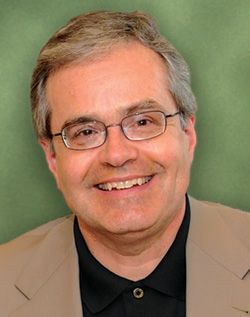Another Look by David Faust
 Known as the Schoolmaster of the Nation, one of the most influential educators in American history was William Holmes McGuffey (1800-1873). While teaching in a one-room school house where his pupils ranged in age from 6 to 21, McGuffey saw the need for textbooks to guide students through different stages of development. In 1826 he became Professor of Languages at Miami University in Oxford, Ohio, where a museum named for him still stands near the center of campus.
Known as the Schoolmaster of the Nation, one of the most influential educators in American history was William Holmes McGuffey (1800-1873). While teaching in a one-room school house where his pupils ranged in age from 6 to 21, McGuffey saw the need for textbooks to guide students through different stages of development. In 1826 he became Professor of Languages at Miami University in Oxford, Ohio, where a museum named for him still stands near the center of campus.
McGuffey created a series of graded reading books for schoolchildren. During the 19th century McGuffey’s Readers became the standardized texts for most schools across the United States, selling more than 100 million books between 1836 and 1890. McGuffey thought public schools should include moral and spiritual education, and for nearly a century the majority of American schoolchildren were exposed to his collections of stories, poems, and speeches.
In an essay called “Duties of Parents and Teachers” published in 1836, William McGuffey wrote:
The Christian religion is the religion of our country. From it are derived our prevalent notions of the character of God, the great moral governor of the universe. On its doctrines are founded the peculiarities of our free institutions. From its sanctions are derived the obligations to veracity imposed in the administration of justice. In its revelations are found the only certain grounds of hope in reference to that else unknown future which lies beyond the horizon of time. It alone places a guard over the conscience . . . . Its maxims, its precepts, its sentiments, and even its very spirit have become so incorporated with the mind and soul of civilization and all refinement that it cannot be eradicated or even opposed without imminent hazard of all that is beautiful, lovely, and valuable in the arts.
The Bible tells about people who received an eclectic education. “Moses was educated in all the wisdom of the Egyptians and was powerful in speech and action” (Acts 7:22). King Solomon’s broad-based learning embraced music, philosophy, botany, and biology. He wrote thousands of proverbs and songs, “spoke about plant life,” and “spoke about animals and birds, reptiles and fish” (1 Kings 4:32, 33). As king he was interested in politics, military strategy, organizational leadership, and financial management; as builder of the temple he cared about architecture and design; as a spiritual leader he called the people to prayer and repentance. Exiled far from his homeland, the prophet Daniel learned “the language and literature of the Babylonians,” and God gave him “knowledge and understanding of all kinds of literature and learning” (Daniel 1:4, 17). Saul (Paul) grew up in the city of Tarsus, which the first-century historian Strabo said surpassed even Athens and Alexandria as a center of education and philosophy. Saul was “thoroughly trained in the law” of the Jewish people under the prominent rabbi Gamaliel (Acts 22:3).
For each of these men, though, faith in God remained at the center of their educational journey. Whatever subject they studied, however far from home they lived, even when their teachers did not share their worldview, they maintained their perspective and kept their faith. Moses “regarded disgrace for the sake of Christ as of greater value than the treasures of Egypt, because he was looking ahead to his reward” (Hebrews 11:26). Solomon learned that when all has been heard, the wise student will “Fear God and keep his commandments, for this is the duty of all mankind” (Ecclesiastes 12:13). Daniel gained the respect of a pagan king and refused to compromise his faith even when he was thrown into a lion’s den. Saul of Tarsus came to realize his need for grace and eventually viewed his own achievements as rubbish in comparison with the surpassing greatness of knowing the Lord Jesus.
It’s good to receive an eclectic education and learn as much as possible about a wide variety of subjects, but it’s even better when education is edifying—when it builds up faith instead of tearing it down. Education should deepen our love for the Lord and increase our capacity to love our neighbors. “Knowledge puffs up while love builds up” (2 Corinthians 8:1). Students, parents, teachers, and school administrators should never forget this elementary lesson: “The fear of the LORD is the beginning of knowledge” (Proverbs 1:7).



Comments: no replies